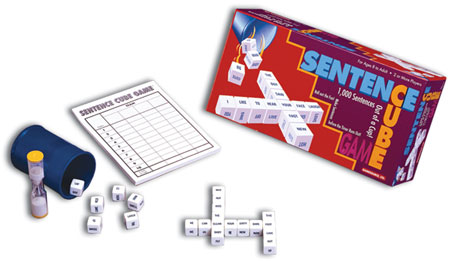Teaching Grammar
and Sentence Construction
Using the Sentence Cube Game

Teaching Grammar |
 |
Introduction
We don't really need the voluminous research that shows there is a connnection between humor, having fun, and effective learning. Common sense tells us that learning is fun: just watch a four-year-old experimenting with environmental control strategies once he grows to a height where he can reach the light switch. We learn how to play games because game-playing is intrinsically rewarding, and we learn how to play them better because success at game playing becomes more satisfying the more successful we become. Involving students in games that promote learning is a sure way to stimulate lively interaction and turn learning from a chore into, well - a game.
Purpose
Supplies/set up
Directions (numbered steps)
Outcomes/experiences
Having only 126 words to work with, some of which do multiple duty as parts of speech, such as the nouns "face" or "fly" also working as verbs, there are obvious limits to sentence content; and only 21 of the 126 words can be used in any one round. Therefore, while a sentence such as "I made her face laugh" may sound a bit awkward, a sentence such as "The good live boy took his slow leg off" may take some explaining or justifying. Additionally, there are no punctuaion marks, so any punctuation is implied. This is actually an excellent feature of the game since it leads to discussion (or justification) of how a sentence makes no sense, for instance, unless "its" has an apostrophe as it is used in a particular construction, or unless there are two commas in a certain sentence construction, etc., etc. Another common discussion during the game is whether subjects and verb agree in number. The game frequently gets hilarious as team members try to explain some sort of context for sentences which may contain a noun and a verb but which stretch notions of logic and rationality, sentences such as "The old man may tatse her new heart later." Maybe his wife just brought home some beef heart from the neighborhood butcher, or maybe she is a recent heart transplant recipient, or (since capital letters are punctuation and punctuation is implied) maybe the popular 70's band Heart just came out with a new album with tracks cut into a rock candy CD, or. . . well. . . yeah.
As the English teacher, I am not only the game emcee, facilitator, and scorekeeper, but also the referee and the ultimate arbiter when it comes to constructions which are not grammatical or contexts which simply have no explanable meanings. In a 50-minute class with three teams competing, we can usually do three rounds, so that is the game limit that I set, and whichever team leads after three rounds wins a prize. I have numerous oversized note pads, purchased at gift shops, that are printed on one side with what looks like American currency and on the other with lines for taking notes on. Therefore, I always say at the start of the game that we are competing for prizes, that I am the ultimate judge and arbiter, and that the winning team will earn "big money." (Which, of course, I don't show until the game is over.)
Caveats
The game is fun and competitive and generates great discussion of grammar, punctuation and sentence sence. While the game has never gotten out of control, it does sometimes get raucous. I once had a very, um, veteran colleague come into my classroom while we were playing the game and ask me to go out into the hall with her, at which point she royally chewed me out for letting such foolishness go on in a classroom, because "They don't know how they're supposed to act in college to begin with!" Though I'm sure they knew how to act in that professor's class.
The only other warning I have is to never, ever play this game with other English teachers. I made the mistake of playing it on a social occassion along with my wife, a one-time English teacher, and her mother, an English major in college. In the absence of an authoritative and impartial referee, and with several players convinced that they, themselves, are the ultimate arbiters of what is "acceptable" English (if not altogether conventional English), things can get ugly. The marriage survived, but partly because, at family get-togethers now, we play pinochle, bridge, global thermal nuclear war, or other such less risky games.
Resources
The game can be purchased on line from numerous sources that will turn up on a Google keyword search. New, it costs $19.99 from the majority of the on-line retailers. I have also seen used versions on E-Bay for half that price. The game has been around since the early 1970's and was orginally marketed as The Scrabble Sentence Cube Game, but it has since been bought out by other companies and has generated some knock-offs.
Rick Dollieslager, English Dept. Chairman
Thomas Nelson Community College
P.O. Box 9407, Hampton, Virginia 23670
Phone: 757/825-3543 Fax: 757/825-3842
Chairman, VCCS Tidewater Regional Center for Teaching Excellence
Return to HOUSSE Institute "What Works for Me"